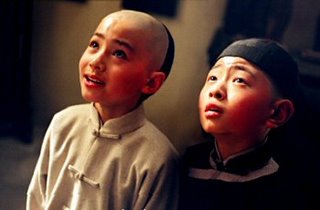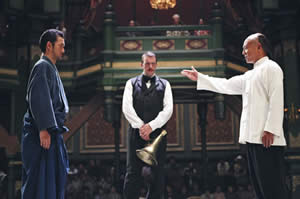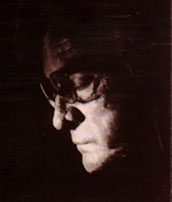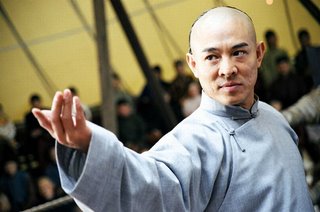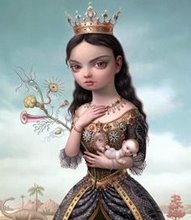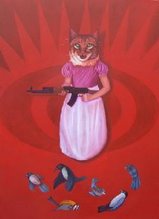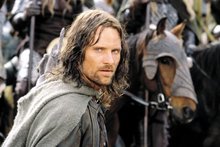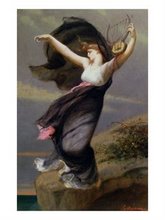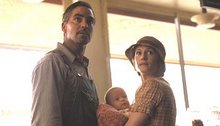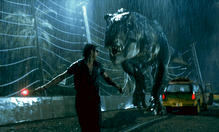I just saw an amazing movie - Jet Li's Fearless. It's a lot like kung fu cult classic that spawned a million sequels Once Upon A Time in China, and yet nothing like it. In both movies, a Chinese civilian decides to uphold the pride of an occupied China by participating in martial arts and beating up on cocky foreigners. But whereas Once Upon A Time in China (also starring Jet Li, and a bespectacled Jackie Chan) is ridiculously unrealistic and fluffy (as fluffy as martial arts can be), ending with a completely hilarious scene where Jet Li kills the completely evil British conqueror by shooting a bullet at him - with his hand - Fearless is heartwrenchingly realistic and human and personal.
Jet Li plays Huo Yuanjia, the son of a martial arts teacher in Tianjin, China, who above anything else wants to be a martial artist like his father, who strictly forbids him from even setting foot in the training room and wants him to learn calligraphy and be a scholar instead. Yuanjia watches his father be defeated in a match as a young boy because he refused to deal the final blow, then subsequently loses his first fight, and vows, "I, Huo Yuanjia, will never be defeated again." So begins Jet Li's swan song to martial arts (it's his last kung fu movie, and also the one that is most personally his), from which the rest of us mere mortals can taste the ambrosia of truth, conveniently in a $10.75 movie ticket.
Huo Yuanjia is extremely cocky at first. He cares only about being undefeated in Tianjin, and it's true that he's incredibly talented - that's not what this movie is about. His physical talent is a given. It's about what makes someone a noble fighter - and that's in the heart, not in the fist. While the fight scenes in this movie are great and a lot of fun to watch, they symbolize so much more than the fight itself. Huo wins fight after fight, and is a local legend with a huge following of disciples who after each victory beg to study with him but don't really do much except get drunk. His little daughter Jade wants Daddy to win (but even more so she wants him to come home) and a homeless guy follows Huo around, asking when he'll be the champion of Tianjin, then answering when Huo asks, "Today! It will be today!" After each fight Huo and his following of disciples drink and feast in Huo's childhood friend's restaurant, running up a humongous tab that Huo just shrugs away - all he cares about is the next challenger that he can shoot down. His childhood friend tries to tell him that maybe he should take a break from the continuous fights and reconsider his life, but Huo refuses. He even lambasts his dead father, saying that he could not finish the final blow, that his heart was not hard enough.
As Huo learns, to have a hard heart is not to have the heart of a true martial arts champion. He learns this in the most horrible way possible, when a series of lies, misunderstandings, and rash, hot-headed decisions lead to the decimation of his life in Tianjin. Huo ends up wandering around China and finds himself in a mountainous village of rice-planters, who take him in and care for him - notably Moon, a blind girl who always smiles now that she's cried all her tears away, and Grandma, who just says, "You'll get over it. Here, have some food." Through being sent to work in the rice paddies and learning that being the fastest rice planter is not nearly as important as planting the rice so it will grow, and appreciating the fresh mountain breezes, Huo transforms himself. He leaves the village, telling Moon that he will return, but he needs to see his parents' graves in Tianjin.
Meanwhile in Tianjin everything has changed. His house nearly foreclosed. Foreigners overrun the streets. Children beg for money from the foreigners, who find them to be amusing little urchins. What used to be the fighting ring is now a crowded, squabbling market place, now that China has been pried open to the West, and Bible thumpers crowd the streets. His disciples are being obnoxious bouncers who nonetheless still worship him, and expect him to solve Tianjin's (and thus China's) problems for them. Huo, now a changed and completely reformed man who no longer drinks, goes to those he has wronged and asks for their forgiveness, then asks for money - so he can travel to Shanghai and defeat a Western fighter named Hercules O'Brien who has defeated every Chinese challenger thus far and proclaims the Chinese to be the "weak men of Asia".
That's the official "plot" of this movie - the Westerners and the Japanese have decided that in order to completely splinter and crush China's morale, they will put on mock martial arts tournaments where they pit Chinese fighters against foreign fighters. When the Chinese fighters lose - and mind you, Hercules O'Brien is one scary ass motherfucker who looks like he should be in WWE, and Jet Li is freaking tiny compared to him - China becomes more depressed and less likely to cause trouble for the occupiers. As Huo and his best friend conclude, China is seen as weak because China is divided. Huo vows to bring China together by defeating the Western fighters thrown at him.
Of course, the movie is really about Huo Yuanjia's transformation, from self-obsessed to conscientious and compassionate, from vengeful to forgiving, from sadistic to kind, from angry to calm. Even his fighting style changes. The way he treats others changes. Everything changes, because he has learned. As his mother told him when he was little, wushu is not about winning. It's about respect, honor, and civility. And I think most of all, it's about who you're fighting for. Yourself? Or your people? It changes what victory means. It changes what even entails a victory.
Suffice it to say that while the ending is not "happy" - it's heartbreaking, in fact, and made me cry - Huo Yuanjia does win - he wins the fight that matters. Jet Li is pouring his heart and soul out on this one, and any fan of his absolutely must see this movie. Hell, even if you're not a fan, it will convince you to be a fan. Another notable performance in this movie comes from Shido Nakamura, playing the Japanese fighter Tanaka who is Huo Yuanjia's final opponent. He's not the evil man you suppose him to be at first. In fact, Huo manages to teach him the lesson of what-is-heroism in the span of their fight, and he learns it. Fuck, China puts on a great performance in this one. When the spectators of the final fight chant at the end of the movie, "Stand strong! Stand strong!" it's really hard to not cry out of being emotionally overwhelmed.
It's also hard not to want to kill some people when the credits roll - life is unfair. But as Huo knows, that's the way it is. We've started the fight - now we have to finish it, regardless of how unfair it is. It reminds me of the ending message of Lord of the Rings: The Fellowship of the Ring: Frodo tells Gandalf, "I wish the ring had never come to me. I wish none of this had happened." Gandalf replies - and Frodo hears him say it again after the wizard has "fallen into shadow" at the hands of the demon balrog, "So do all who live to see such times. But that is not for them to decide. All we have to decide is what to do with the time that is given to us." That's a good summary for the message of this movie, too.
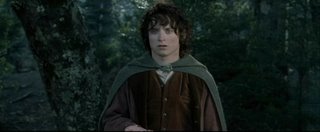 Aren't we all ring-bearers, when it comes down to it? (The Lord of the Rings: The Fellowship of the Ring)
Aren't we all ring-bearers, when it comes down to it? (The Lord of the Rings: The Fellowship of the Ring)It's hard not to feel like Jet Li the man dies at the end of this movie, but he doesn't - he and Huo Yuanjia live on - hence "those who tell the truth shall die, those who tell the truth shall live forever", can coexist with equal weight and truth. If you want a comparable experience, think Johnny Cash's video for his cover of the Nine Inch Nails' "Hurt" - heartfelt, personal, and you know what he's saying is, "this is me, this is my life, these are my mistakes and this is what I have learned, and that is all. I offer myself to the world".
The Washington Post called the characters "cliched" and the motives "murky", but they are completely fucking wrong. I mean, the characters are like the opposite of cliched, and the motives are clearly the opposite of murky! So do not believe those reviews. Watch it. It just might change your life. Or it might at least give you something to think about for the 30-block walk home through the broken world you probably live in (as Kim and I had to do after we saw this movie) - a glimpse of something better, perhaps? This movie is not only like watching the evolution of a man, but watching the evolution of a sport and art form - goddamn, it feels like the ideal evolution of humanity. See it. It will make you believe in the possibility that we might be okay, just maybe, maybe this our third rock from the sun can avoid a nuclear holocaust caused by arrogance and hatred and anger.
I leave you with a quote from A Wrinkle in Time: "We're shadowed. But we're fighting the shadow."


